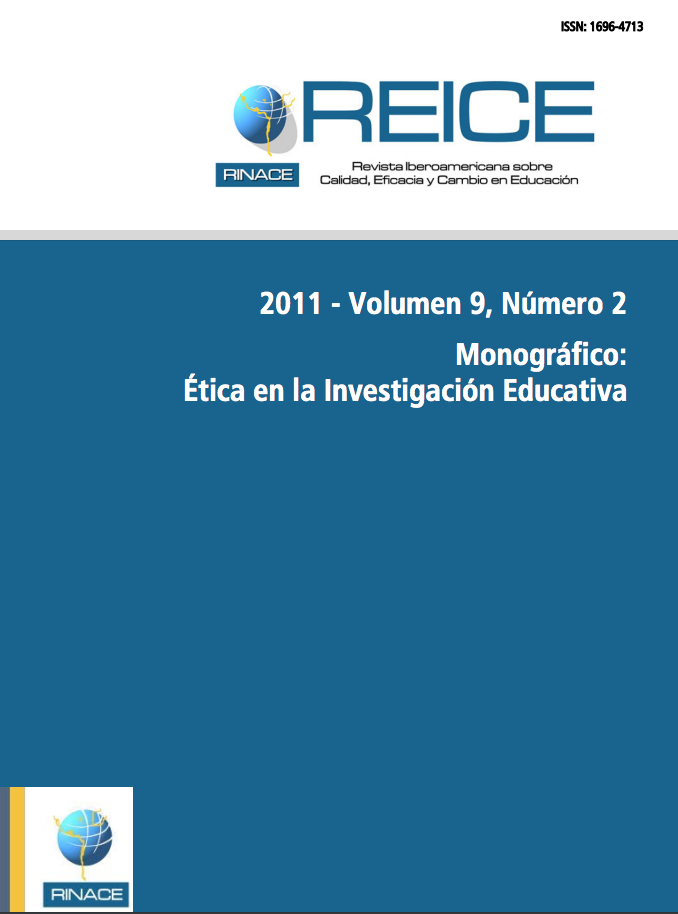Keywords:
Ethics, science, politicsCopyright (c) 2023 REICE. Revista Iberoamericana sobre Calidad, Eficacia y Cambio en Educación

This work is licensed under a Creative Commons Attribution-NonCommercial-NoDerivatives 4.0 International License.
Abstract
In this paper, it is proposed a view, thinking of the issue of ethics in the research process. This view takes as elements of context a society whose ways of construction of subjectivity and social bond are changing. This process is characterized by three significant facts: uncertainty, insecurity and vulnerability, where the tension between what is forbidden and what is permitted weakens only to promote a tear between what is possible and what is impossible. Conditions are exacerbated by the presence of increasing poverty in Latin America, associated to unequal income distribution. In this context, it is distinguished that social institutions, including educational ones, are permeated by a "managerial system" that has turned the scientific production spaces into an inner battlefield, consisting of domains and corporate behavior accompanied by unequal institutional arrangements. Under this set of considerations, the proposal aims at looking away from the explanation of a Decalogue so as to describe forms of organization of scientific production that seek to establish a different link between ethics and politics.
Downloads
References
Aubert, N. y Gaulejac, V. (1993). El coste de la excelencia. ¿Del caos a la lógica o de la lógica al caos? Barcelona: Paidós.
Barnett, R. (1988). Limits to academic freedom. En Tight, M. (comp.), Academic freedom and responsibility. Milton Keynes: Open University Press.
Bauman, Z. (2002), En búsqueda de la política. Argentina: Fondo de Cultura Económica.
Bauman, Z. (2004). La globalización. Consecuencias humanas. México: Fondo de Cultura Económica.
Barman, Z. (2005). Los retos de la educación en la modernidad líquida. Argentina: Gedisa.
Becher, T. (1989). Tribus y territorios académicos. La indagación intelectual y las culturas de las disciplinas. Barcelona: Gedisa.
Castoriadis, C. (1983). La Institución imaginaria de la sociedad, Barcelona: Tusquets editores.
Didou, A.S. (2007). Evaluación de la productividad científica y reestructuración de los sistemas universitarios de investigación en América Latina. Revista Educación Superior y Sociedad, 12(1).
Ehrenberg, A. (1998). La fatiga de ser uno mismo: depresión y sociedad. Buenos Aires: Nueva Visión.
Elizondo, A. y Rodríguez, L. (2009). Los Maestros y la Formación Cívica y Ética. REICE. Revista Iberoamericana sobre Calidad, Eficacia y Cambio en Educación, 7(2), pp. 151-161.
http://www.rinace.net/reice/numeros/arts/vol7num2/art8.pdf
Flores-Kastanis, E., Torre Gamboa, M. de la (2010). El proceso de cambio educativo en México y América Latina. Revista Mexicana de Investigación Educativa, 15(47).
Gil Antón, M. (2004). Amor de ciudad grande: una visión general del espacio para el trabajo académico en México. En Altbach, P. (coord.). El ocaso del gurú. La profesión académica en el tercer mundo. México: UAM.
Foucault, M. (2010). Vigilar y castigar. Argentina: Siglo xxi.
Gutierrez, G. (2006). Comunidades especializadas en investigación educativa en México. Revista cultura y representaciones sociales, 1(1).
Kotter, J. (1995). The New Rules. Nueva York: Dutton.
Mayorga, R. (1999). Los desafíos de la universidad latinoamericana en el siglo xxi, Revista Iberoamericana de Educación, 21. Recuperado de http//www.rieoei.org/rie21a02.htm.
Marginson, S. Ordorika, I. (2010). Hegemonía en la era del conocimiento. Competencia global en la educación superior y la investigación científica. México: Universidad Nacional Autónoma de México..
Ricoeur, P (2001). Amor y justicia. España: Caparrós Editores
Ricoeur, P. (2009). Educación y política. Buenos aires: Prometeo.
Sañudo, L. (2010). Convocatoria reice al número monográfico: Ética en Investigación Educativa. Revista Iberoamericana sobre Calidad, Eficacia y Cambio en Educación. Recuperado de http://www.rinace.net/reice.
